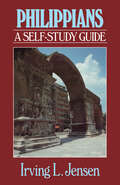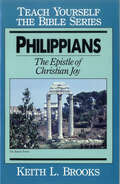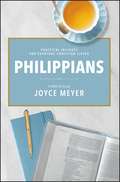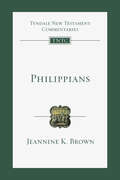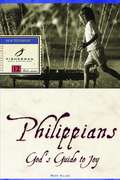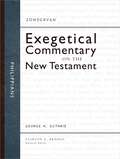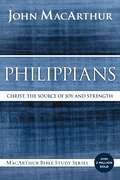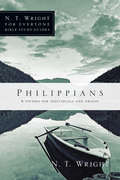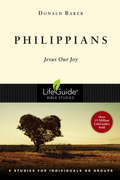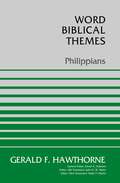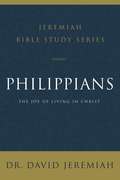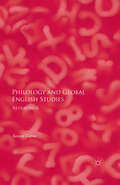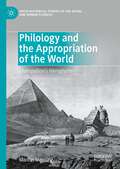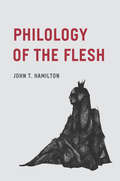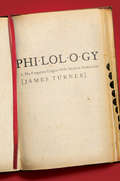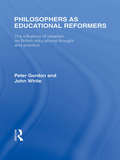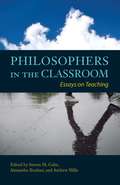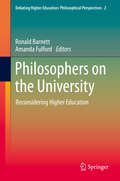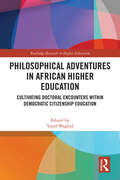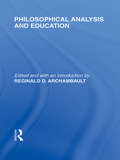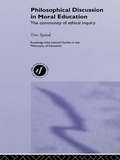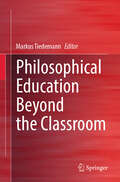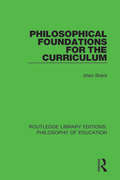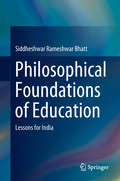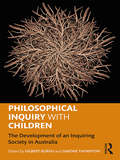- Table View
- List View
Philippians- Jensen Bible Self Study Guide (Jensen Bible Self-Study Guide Series)
by Irving L. JensenThis self-study guide will introduce you to the church at Philippi, where Paul maintained a close and unique relationship with the people who supported him spiritually and financially. Out of a heart of gratitude he wrote them a thank-you letter while imprisoned at Rome. In it Paul describes one of the most important and poignant teachings regarding Jesus Christ. In the second chapter he discusses kenosis—the self-imposed humiliation that typified the life of the Lord as a humble servant, whose obedience went as far as an undeserved sacrificial death for humanity.If you are looking for a comprehensive, challenging tool to use in personal, group, or class Bible study, you will find the Jensen Bible Self-Study series an exciting way to better understand the important truths of God's Word. Each response-oriented guide in the 39-book series features helpful charts, graphs, maps, and ideas for projects and further study. You will refer back to each completed guide as a reference again and again as you study the Scriptures. This study series has enabled millions to effectively explore and understand God's eternal message, and it continues to be a widely-used tool for Bible study today.
Philippians- Teach Yourself the Bible Series: The Epistle of Christian Joy (Teach Yourself the Bible)
by Keith BrooksThe Teach Yourself the Bible Series is one of the best New Testament studies you will find anywhere. Each book in the series is packed full of valuable questions on individual chapters of the Bible, check-ups to test your grasp of scriptural truths, and usable suggestions for group study.Grow in your knowledge of God through each New Testament book, then go on to study six aspects of Christianity essential for all believers: doctrine, prayer, eternal life, prophecy, Christian character, and Bible study.The church at Philippi was Paul's first established in Europe and one for whom he felt special affection. Study this warm letter to the Philippian believers and learn from the problems they encountered as a growing congregation.Strengthen your relationship with the living God with all twenty-five books of the Teach Yourself the Bible Series. Each volume is a timeless, yet practical, study of the Word of God.
Philippians: A Biblical Study
by Joyce MeyerInternationally renowned author and Bible teacher Joyce Meyer provides a close study on Philippians, emphasizing the true joy that comes from serving others through Christ.Paul's letter to the people at Philippi serves as a reminder that if we search for joy in possessions, places, or people, we will always come up short. True, lasting joy comes only through faith in Jesus Christ, living in harmony with His followers, and serving others in the name of Christ. The life lived by the Philippians is still attainable today. In her comprehensive approach, Joyce Meyer takes a deep dive into well-known and beloved verses, identifying key truths and incorporating room for personal reflection.Joyce's Philippians provides a key study tool that will help you develop a stronger relationship with God. If you take time to examine His word, you'll see how much He loves you and how much He desires that you live a joyful, content life on earth!
Philippians: An Introduction and Commentary (Tyndale New Testament Commentaries #Volume 11)
by Jeannine K. BrownThe letter to the Philippians illuminates a warm relationship between the apostle Paul and the Philippian believers.
Philippians: Be Glad (Fisherman Bible Studyguide Series)
by Ronald KlugExperience Joy No Matter What. One of the most joyful books ever written came from a man facing imminent execution in prison. The apostle Paul's letter to the church at Philippi shimmers with the words joy, glad, and rejoice. In this guide, you will learn from one who faced supernatural evil as well as every kind of human problem--and yet could say, "Rejoice in the Lord always, and again, I say, Rejoice!"
Philippians: Christ's People Living in Unity and on Mission (Zondervan Exegetical Commentary on the New Testament)
by George H. GuthrieDesigned for the pastor and Bible teacher, the Zondervan Exegetical Commentary on the New Testament features today's top New Testament scholars and brings together commentary features rarely gathered together in one volume. With careful analysis and interpretation of the Greek text, the authors trace the flow of argument in each New Testament book, giving readers the tools they need to properly understand and communicate the meaning of the text.Commentary on each passage follows a clear structure to help readers grasp the flow and meaning of the text:Literary Context: A brief discussion of how the passage functions in the broader literary context of the book.Main Idea: A one- or two-sentence statement of the big idea or central thrust of the passage.Translation and Graphical Layout: Presents each commentator's translation of the Greek text in a graphical layout to help the reader visualize, and thus better understand, the flow of thought within the text.Structure: Describes the flow of thought in the passage and explains how certain interpretive decisions regarding the relationship of the clauses were made in the passage.Exegetical Outline: The overall structure of the passage is described in a detailed exegetical outline. This will be particularly helpful for those who are looking for a way to concisely explain the flow of thought in the passage in a teaching or preaching setting.Explanation of the Text: Commentators examine words and images, grammatical details, relevant Old Testament and Jewish background to a particular concept, historical and cultural context, important text-critical issues, and various interpretive issues that surface.Theology in Application: The theological message of the passage is summarized. The author discusses the theology of the text in terms of its place within the book and in a broader biblical-theological context. Finally, each commentator provides some suggestions on what the message of the passage is for the church today.The Zondervan Exegetical Commentary on the New Testament series is the go-to resource for pastors and Bible teachers looking for deep but accessible study that equips them to connect the needs of Christians today with the biblical text.
Philippians: Christ, the Source of Joy and Strength (MacArthur Bible Studies)
by John F. MacArthurCircumstances... They are not all they're cracked up to be. For instance, Paul wrote his letter to the Philippians from a Roman prison cell, yet despite those dire circumstances, his major theme in the letter was joy How did Paul find joy in a Roman prison cell? He didn't! He took his joy in Christ into jail with him. Paul's circumstances did not dictate his attitude. In this letter, he demonstrated several life attitudes that were shocking in their audacity and counter intuitiveness:Rejoice in the Lord, alwaysLiving means living for Christ, and dying is even betterThink of others as better than yourselvesWhatever things were gain, count them as lossYou can do all things through Christ who strengthens you!—ABOUT THE SERIES—The MacArthur Bible Study series is designed to help you study the Word of God with guidance from widely respected pastor and author John MacArthur. Each guide provides intriguing examinations of the whole of Scripture by examining its parts and incorporates:Extensive, but straight-forward commentary on the text.Detailed observations on overriding themes, timelines, history, and context.Word and phrase studies to help you unlock the broader meaning and apply it to your life.Probing, interactive questions with plenty of space to write down your response and thoughts.
Philippians: Ephesians, Philippians, Colossians, And Philemon (N. T. Wright for Everyone Bible Study Guides)
by N. T. Wright Sandy Larsen Dale LarsenThings don't always go the way we intend. It's easy to feel discouraged because what we hope for is badly thwarted, or because people make life difficult. Paul, writing to the Philippians from prison, certainly knew what it was like to have plans interrupted. But he maintains robust confidence in God's overruling power, even when everything seems to be going wrong. These eight studies will help us learn from Paul the art of seeing God's purposes working out through problems and difficulties, and will deepen our own confidence in God's power.
Philippians: Jesus Our Joy (LifeGuide® Bible Studies)
by Donald BakerIt's easy to be happy when things go well for you. But what would it be like to have a sense of joy that continued even in times of trouble? Such was the deep joy that the apostle Paul experienced--even in prison. His contentment was neither dependent on circumstances nor changed by difficulty. In his brief letter to the Philippians, Paul will show you too how to live joyfully in every situation.
Philippians: Revised Edition (Word Biblical Themes #Vol. 43)
by Gerald F. HawthorneA companion series to the acclaimed Word Biblical CommentaryFinding the great themes of the books of the Bible is essential to the study of God's Word and to the preaching and teaching of its truths. These themes and ideas are often like precious gems: they lie beneath the surface and can only be discovered with some difficulty. While commentaries are useful for helping readers understand the content of a verse or chapter, they are not usually designed to help the reader to trace important subjects systematically within a given book a Scripture.The Word Biblical Themes series helps readers discover the important themes of a book of the Bible. This series distills the theological essence of a given book of Scripture and serves it up in ways that enrich the preaching, teaching, worship, and discipleship of God's people. Volumes in this series:Written by top biblical scholarsFeature authors who wrote on the same book of the Bible for the Word Biblical Commentary seriesDistill deep and focused study on a biblical book into the most important themes and practical applications of themGive reader&’s an ability to see the "big picture" of a book of the Bible by understanding what topics and concerns were most important to the biblical writersHelp address pressing issues in the church today by showing readers see how the biblical writers approached similar issues in their dayIdeal for sermon preparation and for other teaching in the church Word Biblical Themes are an ideal resource for any reader who has used and benefited from the Word Biblical Commentary series, and will help pastors, bible teachers, and students as they seek to understand and apply God&’s word to their ministry and learning.
Philippians: The Joy of Living in Christ (Jeremiah Bible Study Series)
by Dr. David JeremiahExperience joy in any situation...Follow Dr. Jeremiah through the letter of Philippians in a chapter-by-chapter study that will help you understand what it meant to the people at the time it was written, and what it means to Christians today. The believers in Philippi were experiencing both concern for Paul while he was in prison and spiritual discouragement. Paul wrote this loving letter to encourage them in their faith and to remind them that there was a greater future in store for him and for them outside this world. Paul even admits the tension he feels between living to continue sharing the gospel and dying so he can be with Christ. This mindset allowed Paul to remain joyful in the midst of suffering and he knew the same would be true of the Philippi believers as well.Each of this study's twelve lessons is clearly organized to include:Getting Started: An opening question to introduce you to the lesson.Setting the Stage: A short reflection to explain the context of the study.Exploring the Text: The Scripture reading for the lesson with related study questions.Reviewing the Story: Questions to help you identify key points in the reading.Applying the Message: Questions to help you apply the key ideas to their lives.Reflecting on the Meaning: A closing reflection on the key teachings in the lesson.—ABOUT THE SERIES—The Jeremiah Bible Study Series captures Dr. David Jeremiah's forty-plus years of commitment in teaching the Word of God. In each study, you'll gain insights into the text, identify key stories and themes, and be challenged to apply the truths you uncover to your life. By the end of each study, you'll come away with a clear and memorable understanding of that Bible book.Each study also contains a Leader's Guide.
Philology and Global English Studies: Retracings
by Suman GuptaThis book retraces the formation of modern English Studies by departing from philological scholarship along two lines: in terms of institutional histories and in terms of the separation of literary criticism and linguistics.
Philology and the Appropriation of the World: Champollion’s Hieroglyphs (Socio-Historical Studies of the Social and Human Sciences)
by Markus MesslingThis book sheds new light on the work of Jean-François Champollion by uncovering a constellation of epistemological, political, and material conditions that made his decipherment of Egyptian hieroglyphs possible. Champollion’s success in understanding hieroglyphs, first published in his Lettre à M. Dacier in 1822, is emblematic for the triumphant achievements of comparative philology during the 19th Century. In its attempt to understand humanity as part of a grand history of progress, Champollion’s conception of ancient Egypt belongs to the universalistic aspirations of European modernity. Yet precisely because of its success, his project also reveals the costs it entailed: after examining and welcoming acquisitions for the emerging Egyptian collections in Europe, Champollion travelled to the Nile Valley in 1828/29, where he was shocked by the damage that had been done to its ancient cultural sites. The letter he wrote to the Egyptian viceroy Mehmet Ali Pasha in 1829 demands that excavations in Egypt be regulated, denounces European looting, and represents perhaps the first document to make a case for the international protection of cultural goods in the name of humanity.
Philology of the Flesh
by John T. HamiltonAs the Christian doctrine of Incarnation asserts, “the Word became Flesh.” Yet, while this metaphor is grounded in Christian tradition, its varied functions far exceed any purely theological import. It speaks to the nature of God just as much as to the nature of language. In Philology of the Flesh, John T. Hamilton explores writing and reading practices that engage this notion in a range of poetic enterprises and theoretical reflections. By pressing the notion of philology as “love” (philia) for the “word” (logos), Hamilton’s readings investigate the breadth, depth, and limits of verbal styles that are irreducible to mere information. While a philologist of the body might understand words as corporeal vessels of core meaning, the philologist of the flesh, by focusing on the carnal qualities of language, resists taking words as mere containers. By examining a series of intellectual episodes—from the fifteenth-century Humanism of Lorenzo Valla to the poetry of Emily Dickinson, from Immanuel Kant and Johann Georg Hamann to Friedrich Nietzsche, Franz Kafka, and Paul Celan—Philology of the Flesh considers the far-reaching ramifications of the incarnational metaphor, insisting on the inseparability of form and content, an insistence that allows us to rethink our relation to the concrete languages in which we think and live.
Philology: The Forgotten Origins of the Modern Humanities (The William G. Bowen Series #88)
by James TurnerA prehistory of today's humanities, from ancient Greece to the early twentieth centuryMany today do not recognize the word, but "philology" was for centuries nearly synonymous with humanistic intellectual life, encompassing not only the study of Greek and Roman literature and the Bible but also all other studies of language and literature, as well as history, culture, art, and more. In short, philology was the queen of the human sciences. How did it become little more than an archaic word?In Philology, the first history of Western humanistic learning as a connected whole ever published in English, James Turner tells the fascinating, forgotten story of how the study of languages and texts led to the modern humanities and the modern university. The humanities today face a crisis of relevance, if not of meaning and purpose. Understanding their common origins—and what they still share—has never been more urgent.
Philosophers as Educational Reformers (International Library of the Philosophy of Education Volume 10): The Influence of Idealism on British Educational Thought
by John White Peter GordonThis volume assesses how far the ideas and achievements of the 19th century British Idealist philosophical reformers are still important for us today when considering fundamental questions about the structure and objectives of the education system in England and Wales. Part 1 examines those ideas of the Idealists, especially T. H. Green, which had most bearing on the educational reforms carried out between 1870 and the 1920s and traces their connection with the philosophy and educational theory of Hegel and other post-Kantians. Part 2 is an historical survey, concentrating on the innovations in the organization and contents of education in England and Wales brought about by the administrators and educationists educated in philosophical idealism. Part 3 considers what relevance the philosophical and practical ideas of this interconnected group of reformers have to education today.
Philosophers in the Classroom: Essays on Teaching
by Steven M. Cahn Alexandra Bradner Andrew P. MillsIn these essays, 24 of our most celebrated professors of philosophy address the problem of how to teach philosophy today: how to make philosophy interesting and relevant; how to bring classic texts to life; how to serve all students; and how to align philosophy with more "practical" pursuits. Selected and introduced by three leaders in the world of philosophical education, the insights contained in this inspiring collection illuminate the challenges and possibilities of teaching the academy’s oldest discipline.
Philosophers on the University: Reconsidering Higher Education (Debating Higher Education: Philosophical Perspectives #2)
by Ronald Barnett Amanda FulfordThis book shows the significance of the thinking of philosophers (and other key thinkers) in understanding the university and higher education. Through those explorations, it widens and substantially adds to the emerging philosophy of higher education. It builds on the historical literature on the idea of the university, and provides higher education scholars with highly accessible introductions to the thinking of key philosophers and thinkers, alerting them to a set of literature that otherwise might not be encountered. Until very recently, most of the debate on higher education – both in the public domain and in the scholarly literature – has been conducted with little regard to the philosophical literature. This is odd for two reasons. Firstly, much of the historical literature on the idea of the university – over the past two hundred years – has been written by philosophers and their thinking has largely gone unmined. Second, and perhaps even more importantly, many of the issues in the higher education debate are either philosophical in their nature, or require reflective thinking, and there lies to hand huge resources in the philosophical literature that can help in working through those issues. Issues such as what is to count as knowledge (in the university), wisdom, voice, democracy, culture, what it is to ‘be’ a student or academic, academic freedom, communication, work and disciplinarity cry out for the kind of insights that the philosophical literature – very broadly understood – can offer. This book attempts precisely to do this, to show how the work of key thinkers can help in deepening the higher education debate. Each chapter focuses on an individual thinker, giving both an insight into the thinker in question and accessibly drawing out something of their thinking and showing its significance in understanding the university and higher education. The editors provide a full-length introduction that marks out this large territory and prepares the ground for the reader.The book impressively builds a rich meshwork of careful and thorough thinking around the university and higher education by way of introducing 14 important philosophers on timely subjects such as culture and the university, higher education and democracy, and the role of the university. The volume is a great contribution to the important task of deepening the debate about higher education and the university, through introducing important philosophers in ways that might help the university and higher education work through some of the issues and challenges that it is currently facing. As such, this book is essential reading for anyone wanting to wander and wonder deeper into the core purposes and possibilities of higher education in the good companionship of outstanding thinkers and distinguished academics on these matters. A playground for philosophical thought and adventure.Rikke Toft Nørgård, Associate Professor, Aarhus University, Denmark'This book is an excellent introduction to a wide range of famous thinkers and what they have to say about the university and higher education today. It goes beyond the contemporary preoccupation with metrics, based on managerialism, and takes a much needed philosophical look at what higher education should be, or should aspire to be.'Assoc. Prof. Stephen Loftus, Foundational Medical Studies, Oakland University William Beaumont School of Medicine, USA
Philosophical Adventures in African Higher Education: Cultivating Doctoral Encounters within Democratic Citizenship Education (Routledge Research in Higher Education)
by Yusef WaghidThis seminal volume delves into some of the doctoral research and pedagogical experiences within an African higher education context, making a case for the transformative potential of education and the integration of African indigenous philosophies into global educational practices.Through a collection of vivid narratives, the book situates philosophy of higher education by embodying the doctoral researcher and their initiation into academic life, revealing how doctoral pursuits in African higher education are not simply academic endeavours but deeply philosophical adventures that challenge, critique, and reimagine the role of education in society. Chapters advocate for a dynamic educational system that, rooted in African philosophies, nurtures democratic citizenship, embraces critical engagement, and fosters social justice. A call to action for researchers, students, and policy makers alike to view doctoral research as a powerful catalyst for change, the book offers fresh perspectives on addressing the continent's unique challenges, contributing to a more just and inclusive world.Ultimately considering the potential of academic research to shape the future of societies, both within Africa and globally, the book will appeal to researchers, academics and postgraduate students involved with the philosophy of education, higher education, and citizenship education, as well as these areas in African contexts specifically.
Philosophical Analysis and Education (International Library of the Philosophy of Education Volume 1)
by Reginald D. ArchambaultWhen originally published in 1965 this book reflected some of the new thinking among philosophers regarding the role of the discipline in its investigation of central issues in educaton. The essays are grouped into four major sections: The Nature and Function of Educational Theory; The Context of Educational Discussion; Conceptions of Teaching; and The Essence of Education. The concepts dealt with are of the first importance to any practical or theoretical discussion in education and the editor provides a generous introduction to the essays to aid the reader in his analysis of the issues.
Philosophical Discussion in Moral Education: The Community of Ethical Inquiry (Routledge International Studies in the Philosophy of Education #Vol. 12)
by Tim SprodIn recent years there has been an increase in the number of calls for moral education to receive greater public attention. In our pluralist society, however, it is difficult to find agreement on what exactly moral education requires. Philosophical Discussion in Moral Education develops a detailed philosophical defence of the claim that teachers should engage students in ethical discussions to promote moral competence and strengthen moral character. Paying particular attention to the teacher's role, this book highlights the justification for, and methods of, creating a classroom community of ethical inquiry.
Philosophical Education Beyond the Classroom
by Markus TiedemannDidactics of philosophy and ethics demands problem based orientation and relevance for real life experiences. However, excursions, extracurricular places of learning or 'outdoor education' have hardly been taken into account. A systematic exploration of possible cooperations, synergy effects or incompatibilities has not yet been carried out. The present volume attempts to close this gap and to create an initial basis for further research, testing and discussion. It is intended to make a contribution to teacher training at universities and study seminars as well as to exploratory research in subject didactics.
Philosophical Foundations for the Curriculum (Routledge Library Editions: Philosophy of Education #3)
by Allen BrentIn this book, first published in 1978, Allen Brent sets out to explore some of the questions raised by theorists and philosophers regarding curriculum. He starts by investigating whether all knowledge is the product of social conditions of particular times or places, or whether there is some kind of universal framework implicit in the claims to knowledge which men make. He looks at the work of Plato, Newman, Freire and Hirt and how, each of them in a strikingly different way, they have tried to give us an objective basis for curriculum judgements and how the validity of that basis is attacked by contemporary sociologists of knowledge. This book is aimed primarily at students who are concentrating on the philosophy of education or curriculum theory.
Philosophical Foundations of Education: Lessons for India
by Siddheshwar Rameshwar BhattThis book provides a philosophical foundation to the theory and practice of education from the Indian perspective. It is guided by an 'axionoetic' approach to education and therefore it deals with the epistemological foundation and value orientation of education. The author discusses the ontological, epistemological, logical, ethical and axiological bases of education in a holistic and integrated manner. The author maintains that education is a planned, methodical and purposive enhancement of human potentialities as a natural development. This presupposes correct and adequate formulation of the objectives and goals of education as per the needs and aspirations of pupils. Education also equips individuals for a good quality of life. Keeping in view the applied dimension of philosophy, this book analyses practical issues of moral education like character building value-negativism in the context of education. It also deals with issues concerning peace, sustainable development, sustainable judicious consumption etc. which should have a bearing on educational policies and programmes.
Philosophical Inquiry with Children: The Development of an Inquiring Society in Australia
by Gilbert Burgh Simone ThorntonPhilosophy in schools in Australia dates back to the 1980s and is rooted in the Philosophy for Children curriculum and pedagogy. Seeing potential for educational change, Australian advocates were quick to develop new classroom resources and innovative programs that have proved influential in educational practice throughout Australia and internationally. Behind their contributions lie key philosophical and educational discussions and controversies which have shaped attempts to introduce philosophy in schools and embed it in state and national curricula. Drawing together a wide range of eminent scholars and practitioners in the field of educational philosophy, this anthology, the first of its kind, provides not only a historical narrative, but an opportunity to reflect on the insights and experiences of the authors that have made history. The collection is divided into three parts. The overarching theme of Part I is the early years of Philosophy for Children in Australia and how they informed the course that the ‘philosophy in schools movement’ would take. Part II focuses on the events and debates surrounding the development and production of new materials, including arguments for and against the suitability of the original Philosophy for Children curriculum. In Part III, key developments relating to teaching philosophy in schools are analysed. This collection of diverse views, critical appraisals, and different perspectives of historical currents is intended to stimulate thought-provoking questions about theory and practice, and to increase general awareness both nationally and internationally of the maturation of philosophy in schools in Australia. It is also intended to encourage readers to identify emerging ideas and develop strategies for their implementation.
